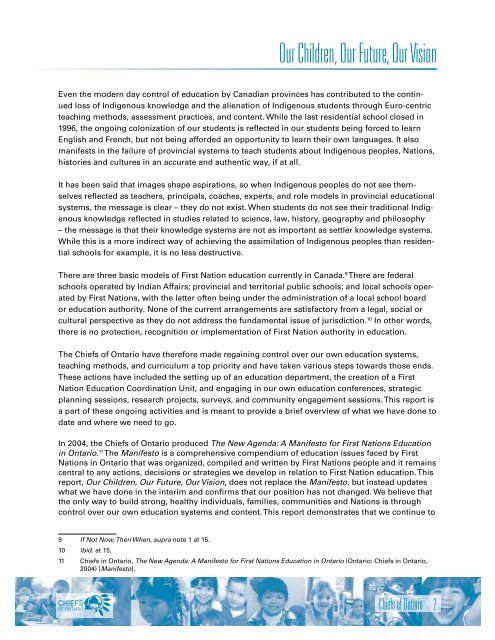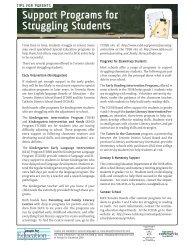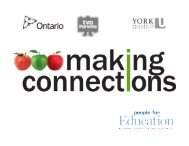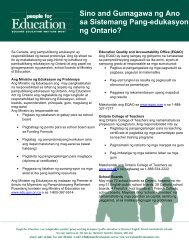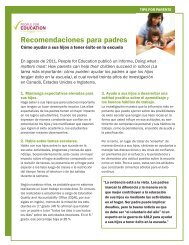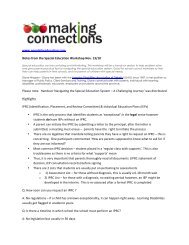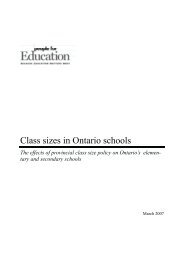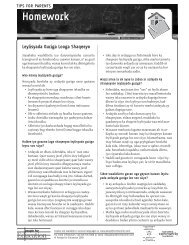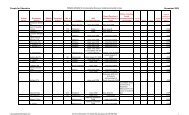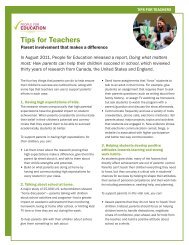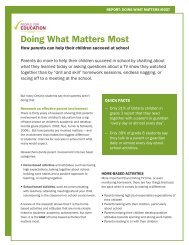Our Children Our Future Our Vision - People for Education
Our Children Our Future Our Vision - People for Education
Our Children Our Future Our Vision - People for Education
Create successful ePaper yourself
Turn your PDF publications into a flip-book with our unique Google optimized e-Paper software.
<strong>Our</strong> <strong>Children</strong>, <strong>Our</strong> <strong>Future</strong>, <strong>Our</strong> <strong>Vision</strong><br />
Even the modern day control of education by Canadian provinces has contributed to the continued<br />
loss of Indigenous knowledge and the alienation of Indigenous students through Euro-centric<br />
teaching methods, assessment practices, and content. While the last residential school closed in<br />
1996, the ongoing colonization of our students is reflected in our students being <strong>for</strong>ced to learn<br />
English and French, but not being af<strong>for</strong>ded an opportunity to learn their own languages. It also<br />
manifests in the failure of provincial systems to teach students about Indigenous peoples, Nations,<br />
histories and cultures in an accurate and authentic way, if at all.<br />
It has been said that images shape aspirations, so when Indigenous peoples do not see themselves<br />
reflected as teachers, principals, coaches, experts, and role models in provincial educational<br />
systems, the message is clear – they do not exist. When students do not see their traditional Indigenous<br />
knowledge reflected in studies related to science, law, history, geography and philosophy<br />
– the message is that their knowledge systems are not as important as settler knowledge systems.<br />
While this is a more indirect way of achieving the assimilation of Indigenous peoples than residential<br />
schools <strong>for</strong> example, it is no less destructive.<br />
There are three basic models of First Nation education currently in Canada. 9 There are federal<br />
schools operated by Indian Affairs; provincial and territorial public schools; and local schools operated<br />
by First Nations, with the latter often being under the administration of a local school board<br />
or education authority. None of the current arrangements are satisfactory from a legal, social or<br />
cultural perspective as they do not address the fundamental issue of jurisdiction. 10 In other words,<br />
there is no protection, recognition or implementation of First Nation authority in education.<br />
The Chiefs of Ontario have there<strong>for</strong>e made regaining control over our own education systems,<br />
teaching methods, and curriculum a top priority and have taken various steps towards those ends.<br />
These actions have included the setting up of an education department, the creation of a First<br />
Nation <strong>Education</strong> Coordination Unit, and engaging in our own education conferences, strategic<br />
planning sessions, research projects, surveys, and community engagement sessions. This report is<br />
a part of these ongoing activities and is meant to provide a brief overview of what we have done to<br />
date and where we need to go.<br />
In 2004, the Chiefs of Ontario produced The New Agenda: A Manifesto <strong>for</strong> First Nations <strong>Education</strong><br />
in Ontario. 11 The Manifesto is a comprehensive compendium of education issues faced by First<br />
Nations in Ontario that was organized, compiled and written by First Nations people and it remains<br />
central to any actions, decisions or strategies we develop in relation to First Nation education. This<br />
report, <strong>Our</strong> <strong>Children</strong>, <strong>Our</strong> <strong>Future</strong>, <strong>Our</strong> <strong>Vision</strong>, does not replace the Manifesto, but instead updates<br />
what we have done in the interim and confirms that our position has not changed. We believe that<br />
the only way to build strong, healthy individuals, families, communities and Nations is through<br />
control over our own education systems and content. This report demonstrates that we continue to<br />
9 If Not Now, Then When, supra note 1 at 15.<br />
10 Ibid. at 15.<br />
11 Chiefs in Ontario, The New Agenda: A Manifesto <strong>for</strong> First Nations <strong>Education</strong> in Ontario (Ontario: Chiefs in Ontario,<br />
2004) [Manifesto].<br />
Chiefs of Ontario<br />
2


